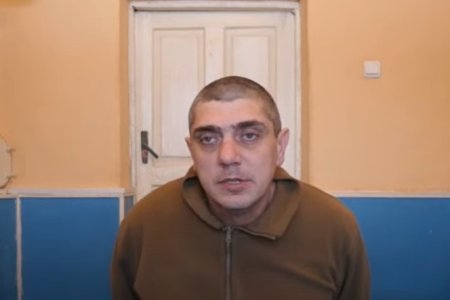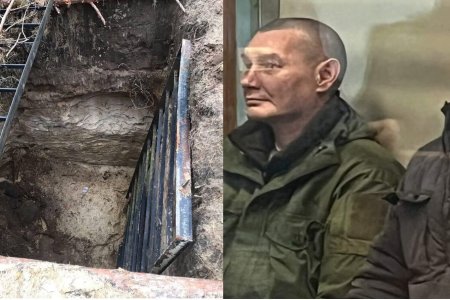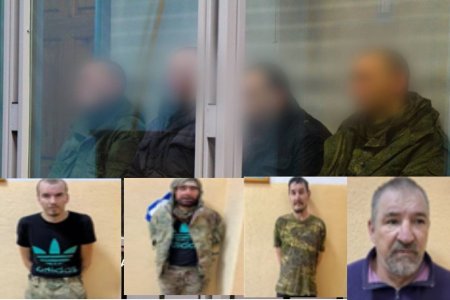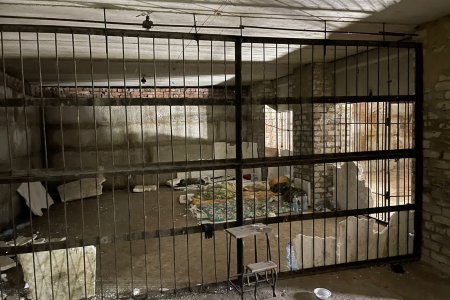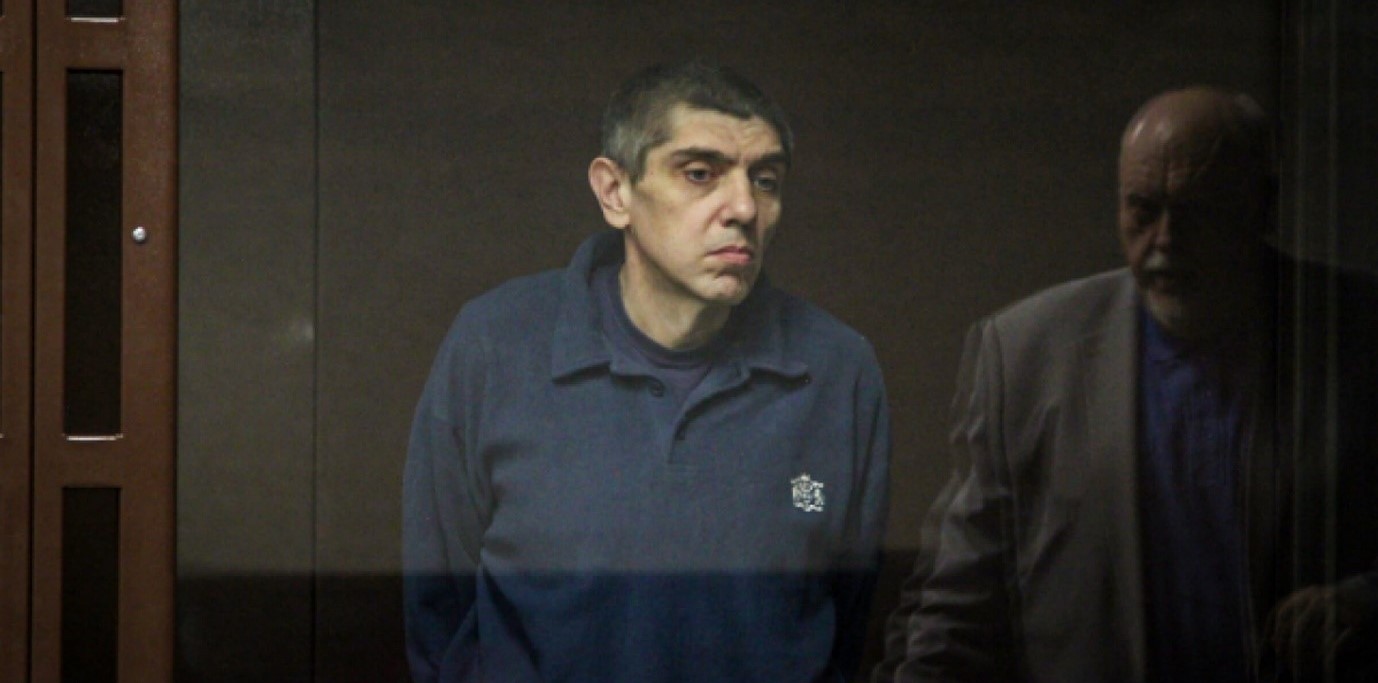
A Russian prosecutor has demanded a 17-year sentence against Ukrainian POW, Anton Cherednyk on several charges, most of them in violation of international law regarding the treatment of prisoners of war. Everything about this ‘trial’ is of concern, from the indictment to the fact that Russia has consistently refused Cherednyk access to independent lawyers and his family. While this will be the first time that Russia has openly ‘tried’ a Ukrainian POW, rather than hiding behind its proxy Donbas ‘republics’, the independent publication Graty report that over eighty such ‘trials’ are planned, with the vast majority of them concerning Ukrainian defenders, held in Russian captivity.
Anton Cherednyk is 44 and a professional marine, with the rank of senior lieutenant in Ukraine’s Armed Forces. His 501st Marine Battalion was stationed in Berdiansk at the beginning of Russia’s full-scale invasion and was sent to the outskirts of Mariupol which Russia was relentlessly bombing and shelling. His part of the Battalion was deployed at the urban settlement Myrne and it was there in March 2022 that some of the marines ended up in Russian captivity (in circumstances that remain unclear).
On 5 April 2022, Ramzan Kadyrov, the Chechen leader installed by Russian president Vladimir Putin, posted a video showing a large group of men and claimed these to be 267 Ukrainian servicemen who had purportedly surrendered to the Russians. It is impossible to identify Cherednyk from the video, but the ‘indictment’ against him does say that he was detained on 4 April 2022
Graty journalist Anton Naumliuk reports that Cherednyk is imprisoned at the SIZO [remand prison] in Rostov-on-Don. It is there that his ‘trial’ began on 4 April 2023 at the same Southern District Military Court that has been sentencing Crimean Tatar and other Ukrainian political prisoners to huge terms of imprisonment since Russia’s invasion and annexation of Crimea. Sergei Aidinov, the prosecutor who has demanded a sentence of 17 years’ harsh-regime imprisonment, has played a direct role in imprisoning many Crimean Tatar civic journalists and activists, as well as 66-year-old Oleh Prykhodko on grotesquely fabricated charges.
As mentioned, Cherednyk has not been allowed independent lawyers, and is represented by a lawyer appointed for him, Vladimir Bakulov. Cherednyk is facing four charges from Russia’s criminal code: ‘planning armed seizure of power’ (Article 278); ill-treatment of the civilian population, the use in an armed conflict of prohibited means and methods (Article 356 § 1); murder (Article 105 § 2) and ‘undergoing training for the purpose of carrying out terrorist activities’ (Article 205.3). Graty believes that the original plan had been to put Cherednyk ‘on trial’ in the Russian proxy ‘Donetsk people’s republic’ [‘DPR’], but that, after Russia staged its fake ‘referendums on joining the Russian Federation’, Russia decided to requalify the charges under Russian legislation.
All but the charge of murder are overtly absurd. Russia is claiming that a Ukrainian serviceman defending his country was ‘planning violent seizure of power’. Such ‘seizure’ was supposed to have been of ‘DPR’, an illegal entity which Russia only ‘recognized’ on the eve of its full-scale invasion and which is not recognized by any democratic state. The claim that a serviceman carrying out military training should be accused of ‘terrorist activities’ is equally preposterous.
It is not in violation of the Geneva Convention to hold any person, including a prisoner of war to account for proven war crimes, with these, in principle, including the deliberate killing of a civilian. There are, however, multiple problems here, including the fact that Cherednyk’s supposed ‘confessions’ were, almost certainly, obtained through torture.
The prosecution claims that, on 27 March 2022, Cherednyk was patrolling Myrne, together with Anton Baidrakov, and stopped two local residents, Oleksandr Piskunov and Serhiy Potseluyev. He allegedly fired into the air and ordered the two men to lie on the ground.
It is asserted that Cherednyk searched the two local residents and then began questioning them. He supposedly demanded that Piskunov pronounce the ‘word «паляниця» [‘palianytsia’]. This refers to a type of bread, but has become a kind of code word for distinguishing Ukrainians from Russians, since the latter cannot pronounce the word correctly. If Cherednyk asked the two men to pronounce the word, this would have been because he suspected them of being Russian and, therefore, of not being civilians.
The prosecution’s material claims that, two days after Cherednyk was detained, he ‘confessed’ to having killed Piskunov. This supposed ‘confession’ was shown on the Russian state-controlled ‘Russia Today’ channel on 9 April, with Cherednyk in a terrible state, and scarcely able to speak. He says that he told “two guys” to stop. They had initially not obeyed, but did then stop, and he told the first one to [inarticulate] palanytsia. “He didn’t answer me. I shot him. The second [said] palanytsia is bread, and I let him go. “ He does not say anything about the men being on the ground. During the ‘trial’, a forensic scientist said it was unclear whether Piskunov had been lying or standing, but did conclude that the shot was in the back.
Earlier Russian reports stated that Piskunov had not pronounced ‘palanytsia’ correctly, and that Cherednyk had then shot him. If so then Cherednyk was too battered during his supposed ‘confession’ to get his lines right. It is certainly more usual to use this word to detect Russian mispronunciation, rather than as a test of whether somebody knows what it is. Such a focus on language, and on a word which numerous videos have shown even young children using with delight when greeting Ukrainian forces liberating their villages or towns, would suit Russian propaganda. The fact that it would be an appalling pretext for killing somebody does not, per se, disprove the allegations. Doubts are, however, exacerbated by the fact that a person who has shot one person dead would surely not let the other one free to tell the tale purely because he knew what ‘palanytsia’ is. The strongest doubts, however, arise because Cherednyk has very clearly been beaten so badly that he seems to have difficulty either thinking or speaking (or both), and because Russia has refused to let him see an independent lawyer. That can only suggest that it has a great deal to hide.
There are three people with victim status in the case: Potseluyev, and Piskunov’s mother and grandmother. It is claimed that there are also witnesses to the shooting (who did not hear what was said) as well as Anton Baidrakov, the Ukrainian serviceman with Cherednyk. Baidrakov is imprisoned in occupied Donetsk and has also been prevented from seeing an independent lawyer or relatives. Naumliuk notes that the court was not informed how the criminal case was initiated and how the alleged witnesses and Piskunov’s grave were found. It is also telling that three propaganda videos with Cherednyk’s interrogation and ‘confessions’ have been presented at the trial as evidence.
Graty have tracked down another, important video on which Cherednyk looks in much better condition. There he also says he shot Piskunov, but there are some crucial differences. He makes it clear that he thought the two men might be Russian soldiers and therefore asked them to pronounce ‘palanytsia’. He says that one of the men ran away; that Piskunov answered his questions and that he shot him not because of the word, which he repeated correctly after Cherednyk, but because he made a sharp move. At that point, the video suddenly stops. Unsurprisingly, it has not been presented as evidence, although it is clearly Cherednyk speaking.
In court, Cherednyk did not deny killing Piskunov, but insisted that he had shot at the man because he was behaving in a suspicious manner and because he made a sharp move as though trying to get out a weapon. He denied having demanded any Ukrainian words and said that this had been needed by the prosecution in order to falsify the charges, to claim that Cherednyk had been motivated by ethnic hatred. He totally denies all of the other charges.
